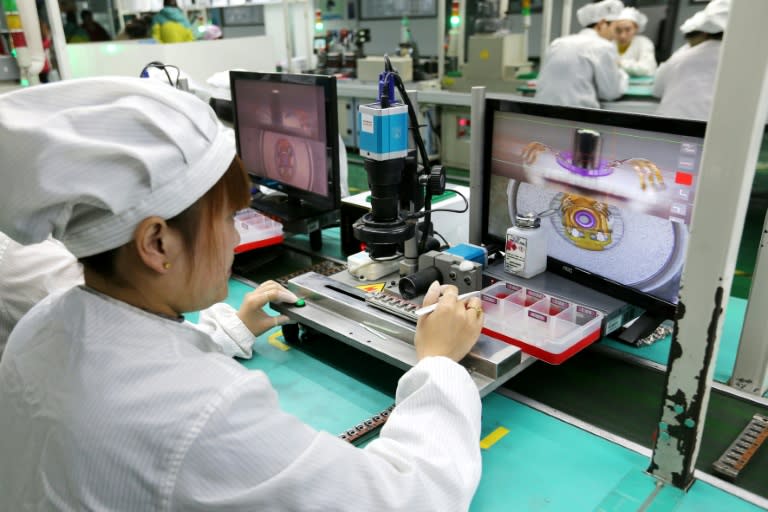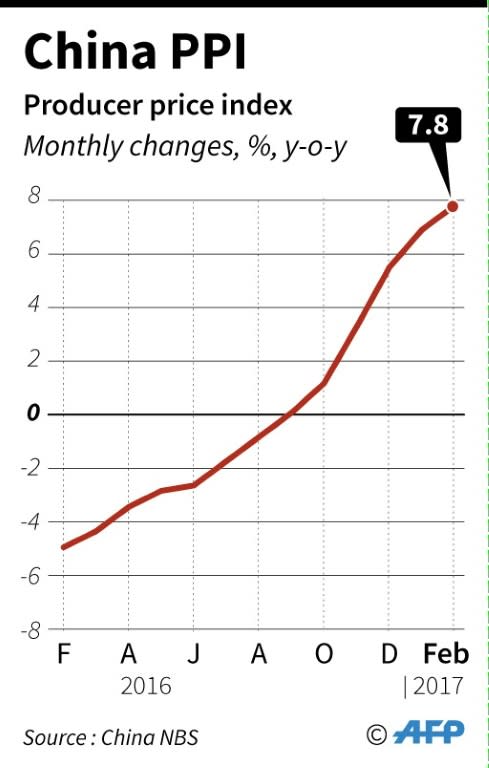China producer prices jump 7.8% in February: govt
China's factory gate prices rose at the fastest pace in more than eight years in February, official data showed Thursday, fuelling hopes the country may export inflation to the global economy. The producer price index (PPI) increased 7.8 percent year-on-year, according to the National Bureau of Statistics (NBS), marking the sixth straight month of rises and beating economist expectations of a 7.7 percent jump in a Bloomberg poll. It was the fastest growth rate since September 2008 and marked an acceleration from the previous five months, raising hopes that the pick-up in prices in the world's top trading nation could filter through to other economies. For years the world economy has been mired in tepid inflation or deflation which, if persistent, tends to be bad for industrial prospects and economic growth because customers delay purchases in hopes of yet-cheaper deals in the future, starving companies of business and funds. The on-year rise in producer prices is partly due to the comparison with a low figure last year, when prices saw a "sharp decrease" in February, NBS analyst Sheng Guoqing said in a statement. China's Lunar New Year holiday falls in January or February and is often blamed for interfering with economic data for the first two months. Increases in oil and natural gas exploitation, coal mining as well as metal smelting also contributed to the expansion, he added. - 'Strange reflation' - The figures follow upbeat reports on China's fourth-quarter economic growth as well as February factory activity and imports that were driven by higher commodity prices. The "strange reflation" helps "corporations by allowing them to push up prices and generate the needed revenues to cover their very high debt burden", said Natixis analyst Alicia Garcia Herrero. But the soaring PPI, which "may have already peaked", did not push CPI up "because there is no recovery in demand yet", Zhou Hao with Commerzbank AG told Bloomberg. Downstream sectors may not reap the benefits of factory gate inflation as "there are few signs" that sales prices are reflecting the rising costs of raw materials, Nomura analyst Zhao Yang said in a note. The data also weakened investors' confidence, sending the benchmark Shanghai Composite Index down by 0.74 percent, as the market is wary of possible interest rate hike, Zheshang Securities analyst Zhang Yanbing told AFP. The consumer price index (CPI), a key gauge of retail inflation, rose 0.8 percent last month, missing the 1.7 percent increase estimated by economists and marking its slowest growth in two years. Ample supply in vegetables and sagging demand for meat after the Chinese new year holiday resulted in a "marked drop" in food prices in the month, and a declining number of tourists after the festival also drove down costs of flights and hotels, Sheng said. Inflation in the country's property sector, which will likely face credit tightening, has not flowed through to service sectors, as inflation in transportation, education, culture and entertainment was "very weak", Zhao Yang said. Looking ahead, authorities will likely prioritise controlling credit risks over restraining inflation, given that consumer prices have still not breached policy makers' "comfort zone", Julian Evans-Pritchard of Capital Economics said in a note. Authorities had vowed to keep the CPI increase "at around three percent" in a work report delivered to the National People's Congress on Sunday.



